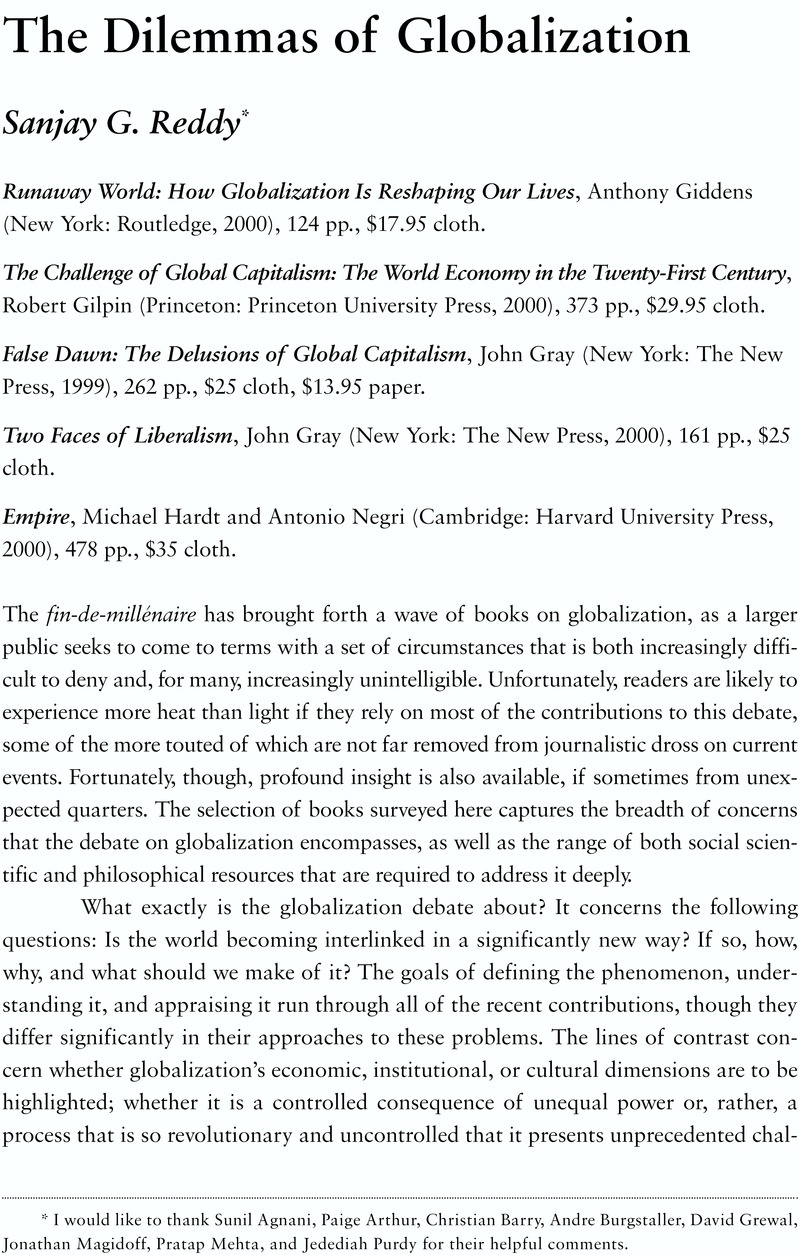No CrossRef data available.
Published online by Cambridge University Press: 28 September 2012

1 Gilpin, , Challenge of Global Capitalism, p. 347Google Scholar.
2 Ibid., p. 1, italics addedGoogle Scholar.
3 The book ends, “If the United States does not resume its leadership role, the Second Great Age of Capitalism, like the first, is likely to disappear” (ibid., p. 357)Google Scholar.
4 Ibid., p. 50Google Scholar.
5 See for example Giddens, Anthony, Consequences of Modernity (Stanford: Stanford University Press, 1991Google Scholar).
6 Giddens, , Runaway World., p. 31Google Scholar.
7 On this idea see also Beck, Ulrich, Risk Society: Towards a New Modernity, trans. Ritter, Mark (London: Sage Publications, 1992)Google Scholar.
8 One need only think here of the ancient Christian, Muslim, and Buddhist traditions of providing intellectual justification of favored precepts to both believers and nonbelievers. This activity sometimes goes under the name of theologyGoogle Scholar.
9 One can think here of Locke's hostility to Catholics in A Letter Concerning Toleration. On the case of John Stuart Mill, see for example Mehta, Uday Singh, Liberalism and Empire: A Study in Nineteenth-Century British Liberal Thought (Chicago: University of Chicago Press, 1999Google Scholar).
10 On this proposition see Roberto Unger, Mangabeira, Democracy Realized: The Progressive Alternative (New York: Verso, 1998Google Scholar).
11 Anthropological examples are plentiful. For an argument regarding the link between increased religious self-assertion in India and the increased “thinness” of religious experience, see Kaviraj, Sudipta, “Religion, Politics and Modernity,” in Crisis and Change in Contemporary India, Baxi, Upendra and Parekh, Bikhu, eds. (New Delhi: Sage Publications, 1995Google Scholar).
12 Giddens, , Runaway World, p. 37Google Scholar.
13 Giddens goes so far in his neglect of the role of power in shaping the form of globalization that he writes of the ostensibly increasing prevalence of “reverse colonization,” in which “non-Western countries influence developments in the West” (ibid., p. 34)Google Scholar.
14 Gray, , False Dawn, p. 170Google Scholar.
15 Gray, , Two Faces of Liberalism, p. 34Google Scholar.
16 Ibid., p. 68Google Scholar.
17 For the idea of an overlapping consensus see Rawls, John, Political Liberalism (New York: Columbia University Press, 1993Google Scholar).
18 Gray, , Two Faces of Liberalism, p. 105Google Scholar.
19 IbidGoogle Scholar.
20 IbidGoogle Scholar.
21 This is the sense in which the phrase is used by Rawls in Political Liberalism, sometimes prefaced by “mere.”Google Scholar
22 Hence they hold that “imperial expansion has nothing to do with imperialism”; rather, “against such imperialisms, Empire extends and consolidates the model of network power.” Hardt and Negri, Empire, pp. 166–67Google Scholar.
23 Thus, Hardt and Negri describe the special role of the United States as deriving from its being “the only power able to manage international justice, not as a function of its own national motives, but in the name of global right” (ibid., p. 180)Google Scholar.
24 Ibid., p. 182Google Scholar.
25 Ibid., p. 314Google Scholar.
26 This difficulty of course overshadows the entire Marxian tradition to which Hardt and Negri belongGoogle Scholar.
27 Ibid., pp. 60–61Google Scholar.
28 For an excellent account of such struggle between major economic powers in the postwar period see James, Harold, International Monetary Cooperation since Bretton Woods (Washington, D.C.: International Monetary Fund, 1996Google Scholar).
29 “The multitude, in its will to be against and its desire for liberation, must push through Empire to come out the other side”(Hardt, and Negri, , Empire, p. 218Google Scholar).